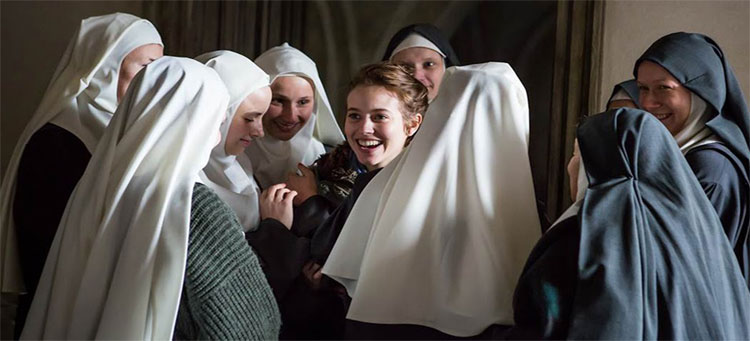 Starring: Lou de Laâge, Agata Buzek, Agata Kulesza
Starring: Lou de Laâge, Agata Buzek, Agata Kulesza
Director: Anne Fontaine
Running time: 111 mins
Certificate: 15
UK Release date: November 11th 2016
Well that’s the film of the year sorted then. This tale, concerning the end of WWII set in a Polish nunnery, is so flawless in its execution and so beautifully written and played it’s a struggle to find anything other than praise to describe it. Perhaps the translation of the nun’s description of the nights the nunnery was invaded by soldiers as “nightmare” from the French “L’horreur” doesn’t quite do that word justice, and perhaps the heroine is a touch too perfect – she’s a surgeon who looks like a model, saves lives, likes a brandy and a fag and can drive a truck. Apart from that, sit back and let the most extraordinarily moving story unfold in front of your eyes.
Lou de Laâge is Mathilde, an apprentice surgeon working for the French Red Cross in Poland in December 1945, patching up soldiers before they can go home. She is determined, capable and liked by chief surgeon Samuel, a Jew with whom she has the odd flirt with – they are French, after all.
Into Mathilde’s life comes Maria, a young nun who insists the surgeon comes to the nunnery to treat an ill friend. It quickly becomes obvious that many of the nuns have been raped – possibly by fleeing Nazis, possibly by drunk Russian soldiers, possibly both. Seven of them are now pregnant, and desperately need medical care. Mathilde of course provides it, but what she can’t heal is the damage to their minds and hearts. Some of the nuns believe it is all part of God’s plan, some believe in forgiveness, some believe it is some sort of punishment for sins. All of them know though that evil has taken place.
Mathilde of course becomes involved in their desperate plight, but her bosses are none too happy when they find out, and neither is the Mother Superior, who regards the whole episode as shameful. She tells Maria that Mathilde has brought “shame” upon the place – Maria points out that surely the shame was brought by the soldiers. Added to Mathilde’s problems are their beliefs – nuns are not meant to be physically touched, nor are they supposed to expose their flesh, tricky when they are about to give birth.
What is remarkable about this story is it is told with such depth and complexity with an austere script and virtually no colour. Nuns aren’t famous for their dialogue, and even Mathilde says very little, a complaint made by her cheery boss Samuel, yet so much is compressed into the tale. Her position is fascinating – she has been trained to help people and put them out of pain, regardless of religion or race, yet she is up against a wall of silence and women who appear to genuinely believe it is all in God’s hands – even rape. Her quiet determination to help these desperate women is utterly captivating.
Setting the film in winter gives it a bleakness totally befitting the subject matter, there are several shots of Maria stomping through a snowy forest which feature just black and white, and the nunnery is a drab washed out brown. It makes the brief flashes of colour even more dazzling, only Mathilde’s blue scarf, red dress and bright blue eyes remind you the film is actually in colour.
Then there are the performances. If Amelie was the film that launched Audrey Tatou onto the world, this is the film that will make Lou de Laâge. It’s an extraordinary performance in a part which gives her almost no light moments or release. She is stoic, determined, moving and compelling. An early moment when we see her finishing up stitching a wounded man tells all – she is calm, reliable and has total concentration withy steady hands. She is matched by Buzek as the vulnerable, desperate nun who asks her for help, and their friendship is deeply convincing.
Overall Verdict: Not many films made by the Polish Film Board are released in the UK, but this one is a shoo-in for Best Foreign Language Oscar. It’s powerful and devastating in its complexity but never less than compelling to watch.
Reviewer: Mike Martin
You must be logged in to post a comment.